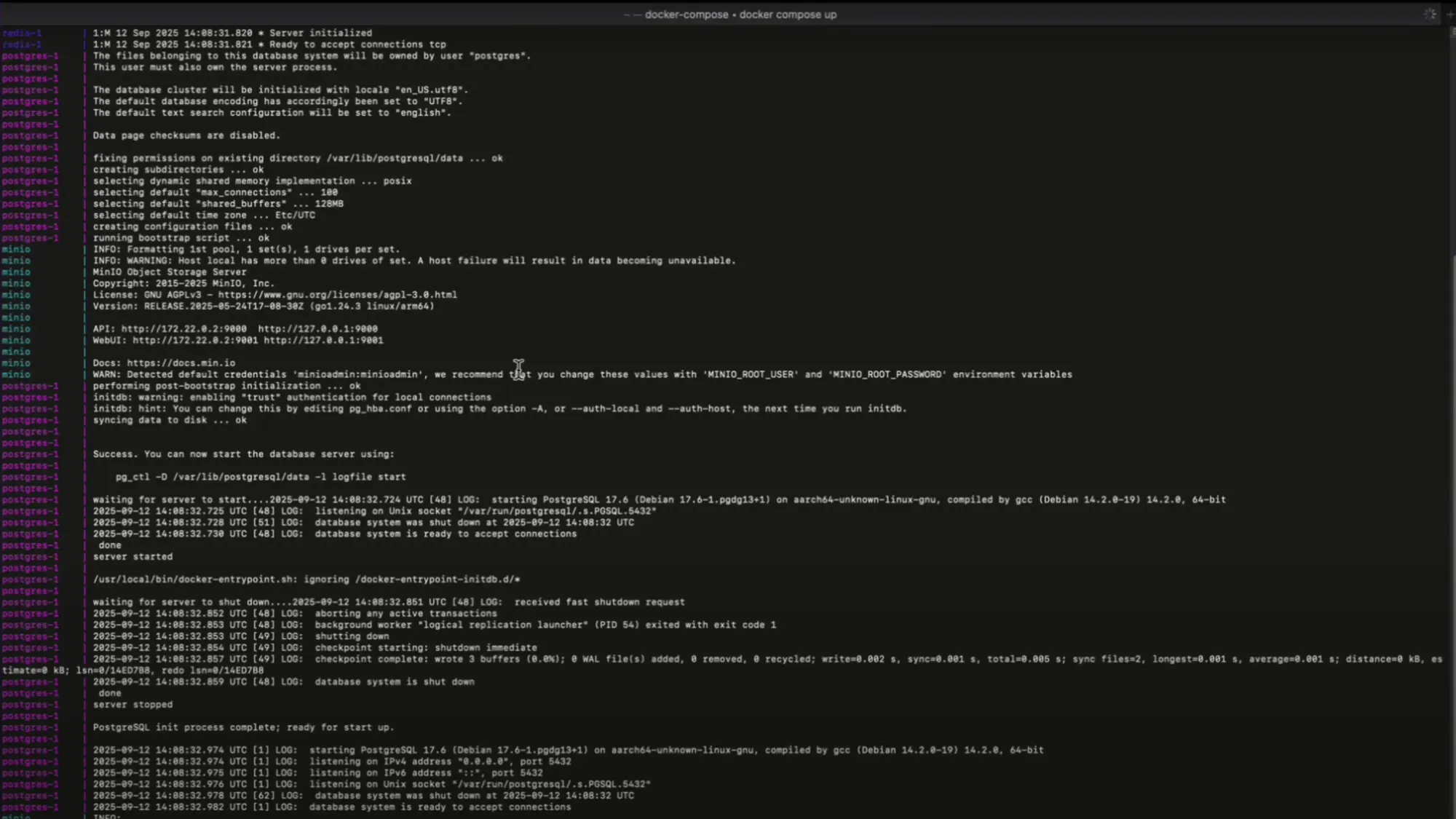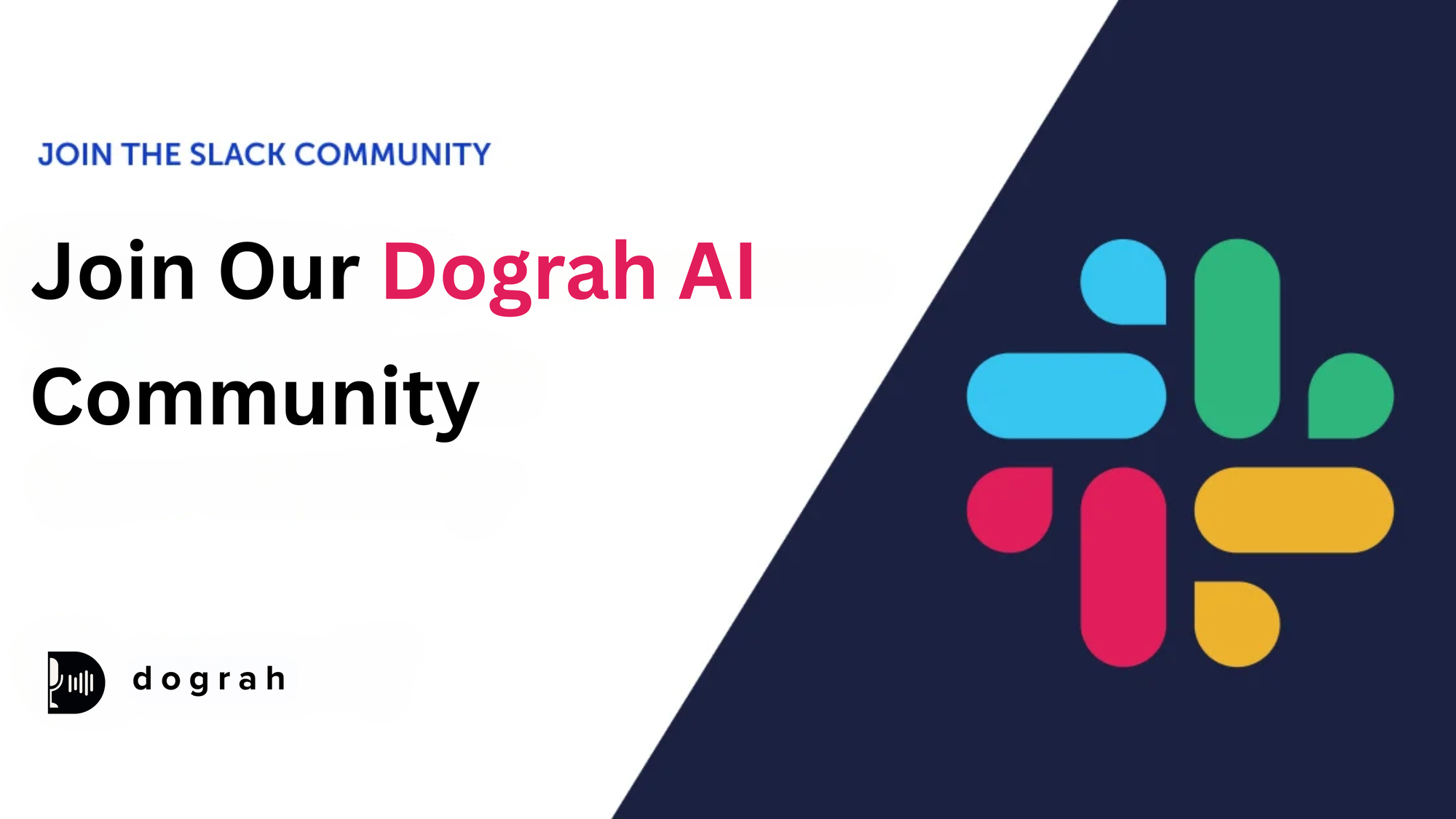Vapi is a voice AI platform built for developers and businesses to automate workflows using conversational AI. It supports integration with telecom providers like Twilio (inbound/outbound), Vonage, Telnyx and offers flexible tools for LLMs (GPT-4.1, Claude 3 Opus, Grok Beta), STT (Deepgram, ElevenLabs, Gladia), and TTS (Vapi, PlayHT, ElevenLabs) to build custom voice workflows.
Vapi is a powerful tool, but its pricing model can be confusing. While it allows customization based on usage, the final costs often end up higher than expected due to hidden charges. As one Reddit user put it, “VAPI isn't great and it's very costly. Paying a hefty amount for this software doesn't make sense.”
This blog breaks down Vapi AI’s pricing, showing what each plan includes, where hidden charges are included and which features cost extra. It also explains how the pricing works with real examples and compares it with Dograh, an all-in-one open-source voice AI platform.
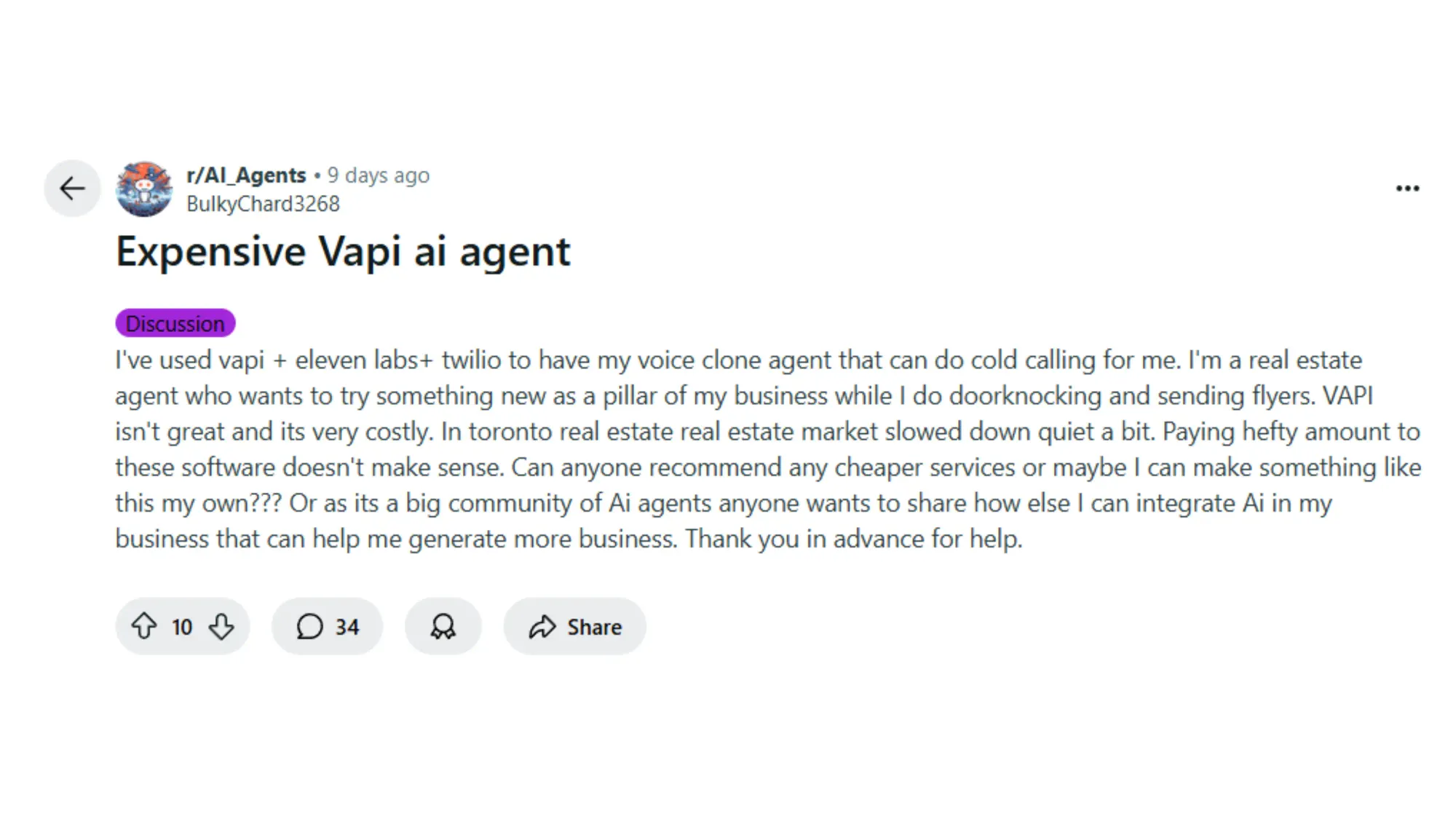

Table of Contents
- Vapi Pricing at a Glance
- How Vapi AI Pricing Works and Tiers Comparison
- How to Calculate your Monthly Bill with Vapi
- Pros and Cons of Vapi Pricing
- How Vapi compares to Dograh
- The Bottom Line: Is Vapi AI Worth it ?
- Build a free AI voice agent with Dograh Today
- Cost Optimization Strategies
- Final Thoughts
- FAQ’s
Migrate from VAPI: Save upto 90% time with Dograh Voice AI.
Dograh offer an open-source, no-code Voice AI builder that lets you control and deploy voice agents in minutes with reliable multi-agent conversational flows.
Vapi Pricing at a Glance
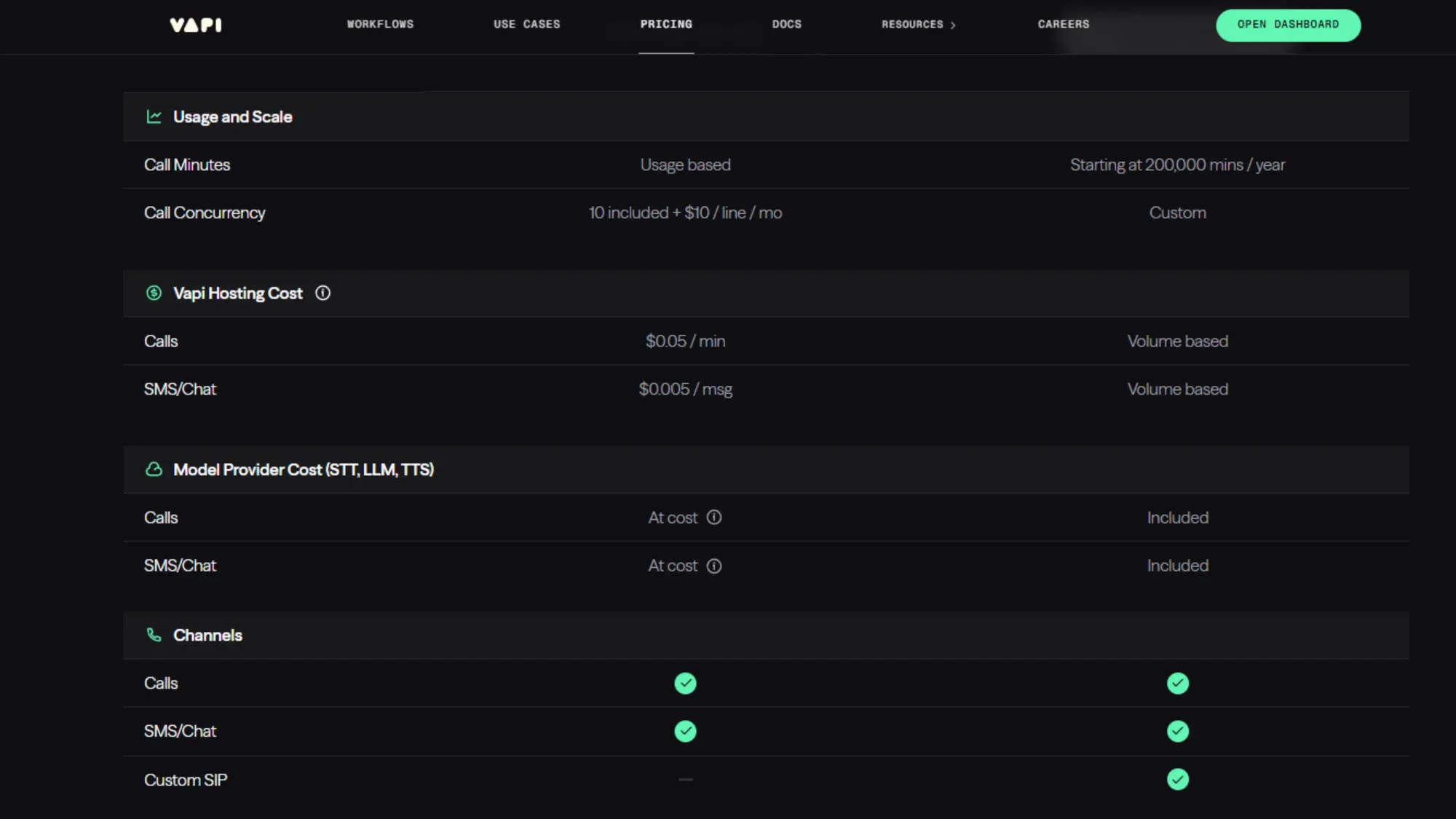
Vapi AI follows a usage-based pricing model, built for scalability and transparency across all business sizes. Costs are mainly based on call minutes, with multiple plan tiers available.
Core Pricing Structure
- Vapi Hosting : Container-based hosting for your voice agents at $0.05 per minute.
- Transport : Transport and data transfer fees are billed directly by providers, not Vapi. Rates include Twilio ($0.008–$0.014/min), Vonage ($0.00814/min), and Telnyx ($0.0055/min).
- Large Language Model (LLM) : LLM usage is billed separately based on provider, with rates per 1M tokens: OpenAI (GPT-4.1) at $0.06, Claude 3 Opus $0.09, Grok Beta $0.14, Mistral Large $0.002, and Gemini 1.5 Flash $0.09.
- Test-to-Speech (TTS) : TTS (Text-to-Speech) costs vary by provider for natural, high-quality speech synthesis: Vapi charges $0.0216/min, ElevenLabs $0.036/min, Deepgram, Azure, and OpenAI each at $0.0108/min, PlayHT $0.0648/min, and Smallest AI $0.02/min.
- Speech-to-Text (STT) : STT (Speech-to-Text) pricing for fast, accurate transcription varies: Deepgram at $0.01/min, ElevenLabs $0.00667/min, Gladia $0.0126/min, Talkscriber $0.011/min, Assembly AI offers the lowest at $0.00025/min, and Azure at $0.017/min.
New Signups get approximately 60 minutes free or $10 in trial credit for testing. Vapi promotes $0.05/min pricing, but actual costs increase with third-party services, usage volume and advanced features. While pricing is transparent, it can become unpredictable without close monitoring.

How Vapi AI Pricing Works and Tiers Comparison
Vapi AI uses a usage based pricing model that gives you access to its platform through four main plans. The comparison below shows monthly plans that include a fixed number of minutes for phone usage.
Pricing Plan Comparison :
- Ad - Hoc (Pay as you go) - Vapi charges a flat rate of $0.05 per minute with no scaling or tiered pricing costs remaining the same whether you use 10 or 10000 minutes. This fee covers only the Vapi platform, while additional charges from providers like STT, TTS, or LLM are billed separately. For example - 1000 minutes would cost $50 in Vapi fees, plus provider costs. Businesses with high-volume needs can reach out to Vapi for potential discounts.
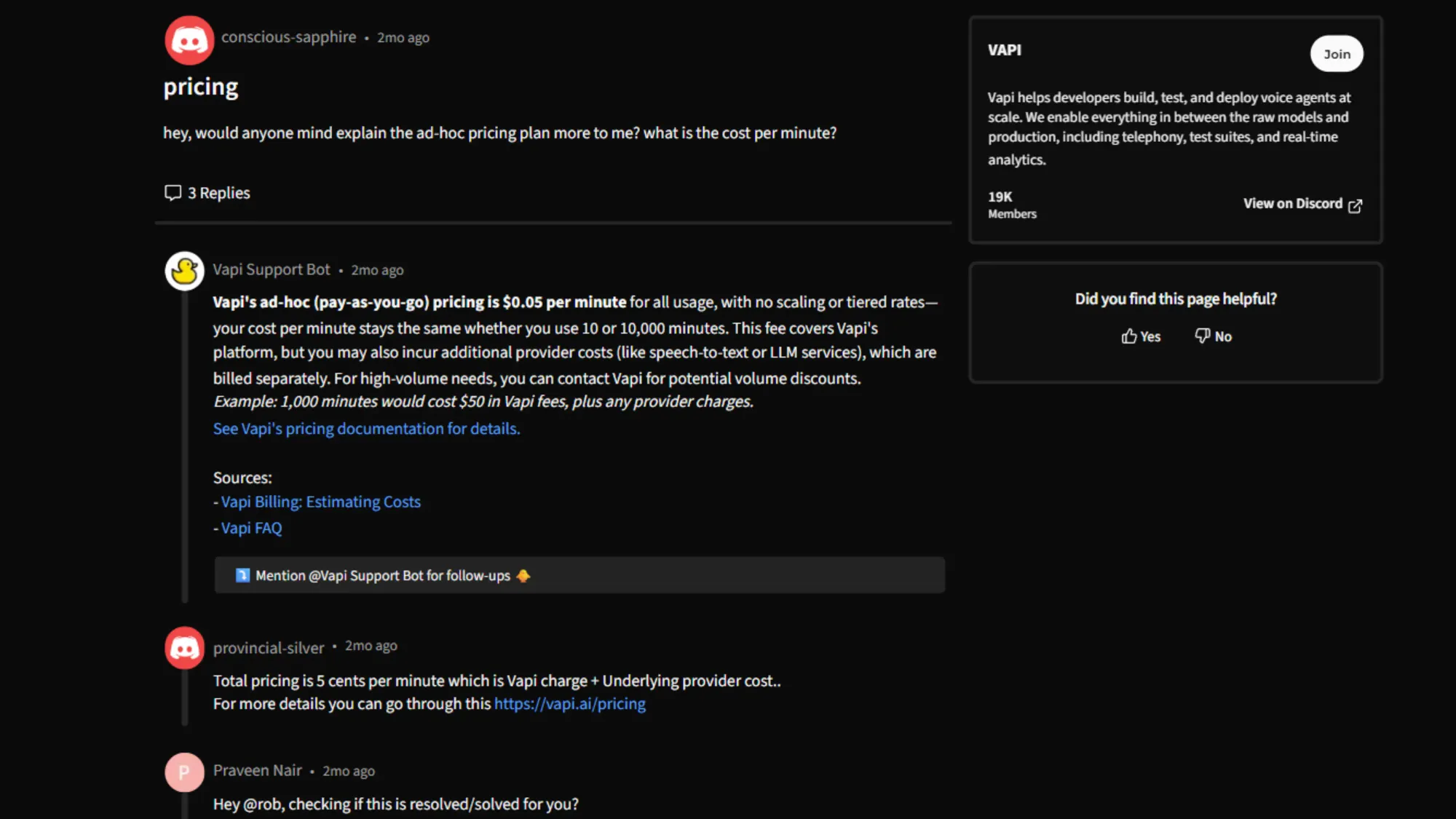
- Agency Plan - $500 / month for agencies managing multiple clients. Includes packed minutes and shared resource allocation.
- Monthly included minutes
- Centralized management for multiple agents
- Shared usage analytics & tooling
- Startup - $999.98 / month Ideal for growing teams. Includes packaged minutes and reduced variable rates. Comes with added dashboard features and limited support.
- Monthly included minutes
- Reduced per-minute rate beyond included minutes
- All ad-hoc infrastructure & features
- Team collaboration tools
- Enterprise custom Tailored for high-volume deployments. Includes SLAs, volume discounts, dedicated support, SOC 2 compliance, and onboarding assistance.
- Platform fee + provider costs, with volume discounts
- SLA-backed performance & uptime
- Enterprise security + custom onboarding
- Dedicated success team
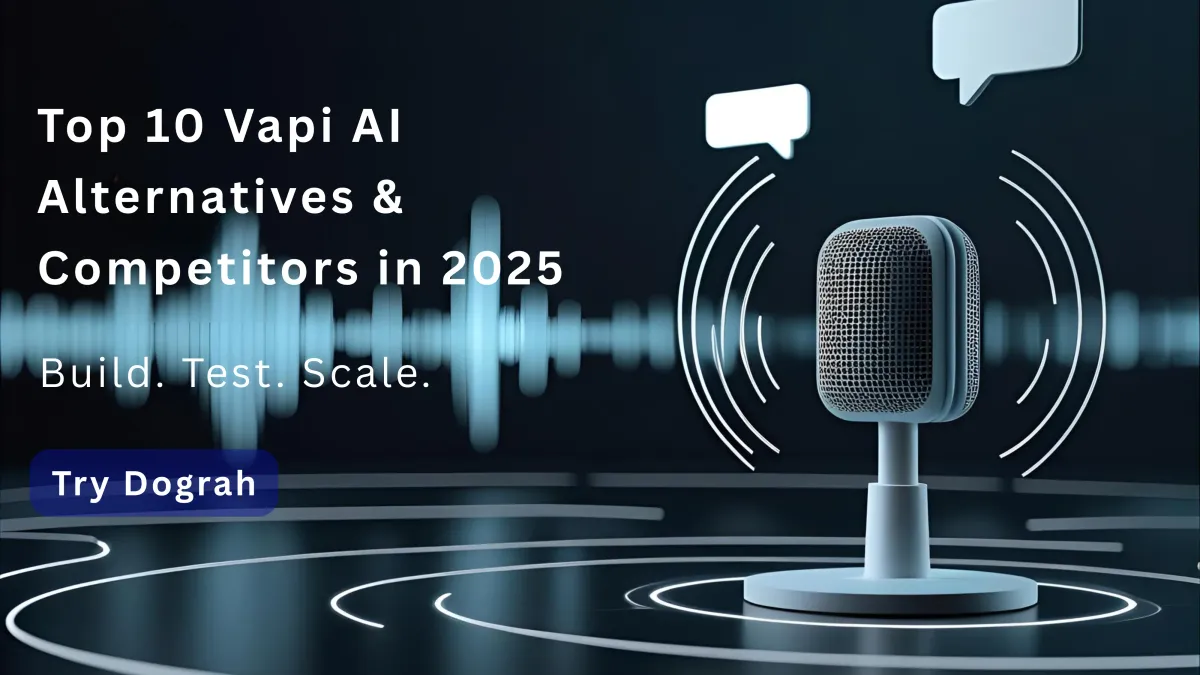
Top 10 Vapi AI Alternative & Competitors in 2025
What’s Included in the Base Plans
The base plans for Vapi AI provides access to essential platform features required to build, test and operate AI Voice agents. However, real-world production use requires separate integration and payment for multiple external services. Here's what’s included:
- Platform Access - Full access to dashboard and flow studio, a no code drag and drop builder to design custom voice agents flows.
- Trial Usage - New users receive a free trial with $10 credit to test 150 to 200 minutes of calls.
- Concurrent SIP Lines - Every Vapi plan includes 10 concurrent SIP lines, which dictates how many simultaneous calls your AI voice agents can handle.
- API / SDK Access - Integrations with rest of APIs and SDKs for connecting to Vapi to Web, IOS, Android and backend systems.
- Bundled Minutes - Plan Startup, Enterprise and Agency give a fixed number of call minutes. Ad-Hoc plan is fully pay-as-you-go with no monthly bundle.
- Vapi CLI - Vapi CLI is the official command line interface that brings world class developer experience to your terminal and IDE.
- MCP Integration - The Model Context Protocol (MCP) Integration allows your Vapi assistant to dynamically access tools from MCP servers during call.
Not Included -
- STT (Speech-to-Text) & TTS (Text-to-Speech) - Users need to bring his own or pay for the built in services. Providers like Deepgram, ElevenLabs, PlayHT and Gemini required their own billing accounts with per-minute or per-characters fees.
- Telephony Charges - Inbound and Outbound call fees from providers like Twilio & Vonage need to be purchased separately from providers.
- AI Model Usage - For using GPT, Claude, Gemini or similar LLM their per API call / tokens costs billed separately.
- Compliance Tools - HIPAA, PCI, and DPA compliance come at an additional cost of $1,000 per month.
SIP and Call Infrastructure
SIP (Session Initiation Protocol) lines, which dictates how many simultaneous calls your AI voice agents can handle. This concurrency is crucial to prevent call queuing or drops during busy periods.
Core SIP and Call Infrastructure :
- Agency Plan - Includes $500/month bundled minutes, 50 call concurrent lines, multi-client support and basic priority support. Extra SIP lines: $10 each/month.
- Startup Plan - Includes $999.98/month a larger minute bundle, 100 call concurrent lines, advanced features, and multi-client enhancements for high-volume use.
- Enterprise - Custom pricing based on needs, includes unlimited call concurrent lines/minutes, premium SLAs, compliance (HIPAA, DPA, PCI), and dedicated support.
Additional SIP lines can be added based on your specific requirements, with each line costing $10 per month.
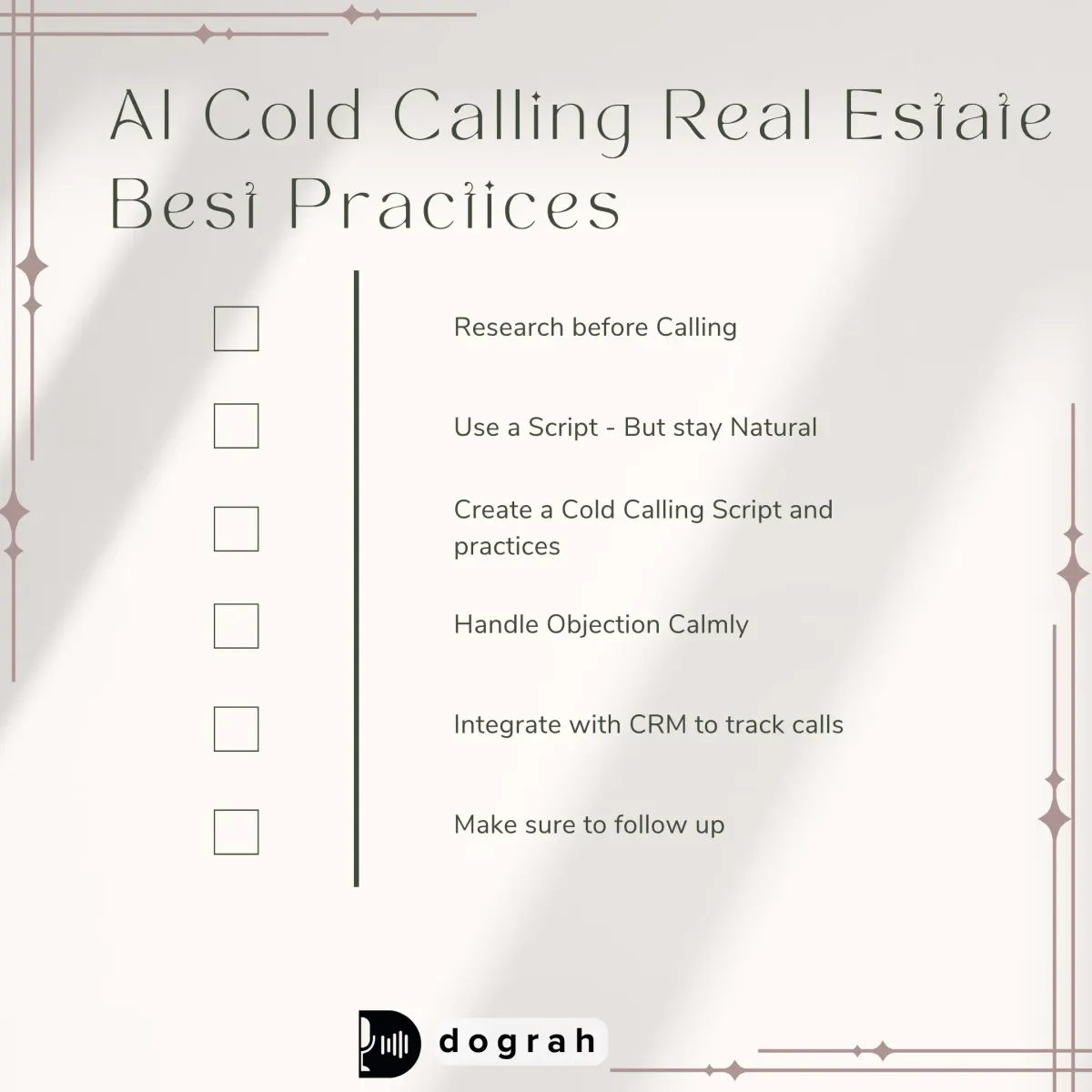
AI Cold Calling Real Estate Script & Best Practices | Boost Leads with Voice AI
Hosting and Surge Costs
Vapi AI's usage-based pricing includes hosting and surge costs, but these are important to distinguish as they can heavily influence your total monthly expenses.
- Standard Hosting : $0.05 per minute.
- Surge Hosting : An additional $0.05 per minute is charged during traffic surges.
Vapi charges $0.05 per minute for each active call. If you need more than 10 SIP lines, each extra line costs $10 per month.
Real Cost Breakdown Estimate
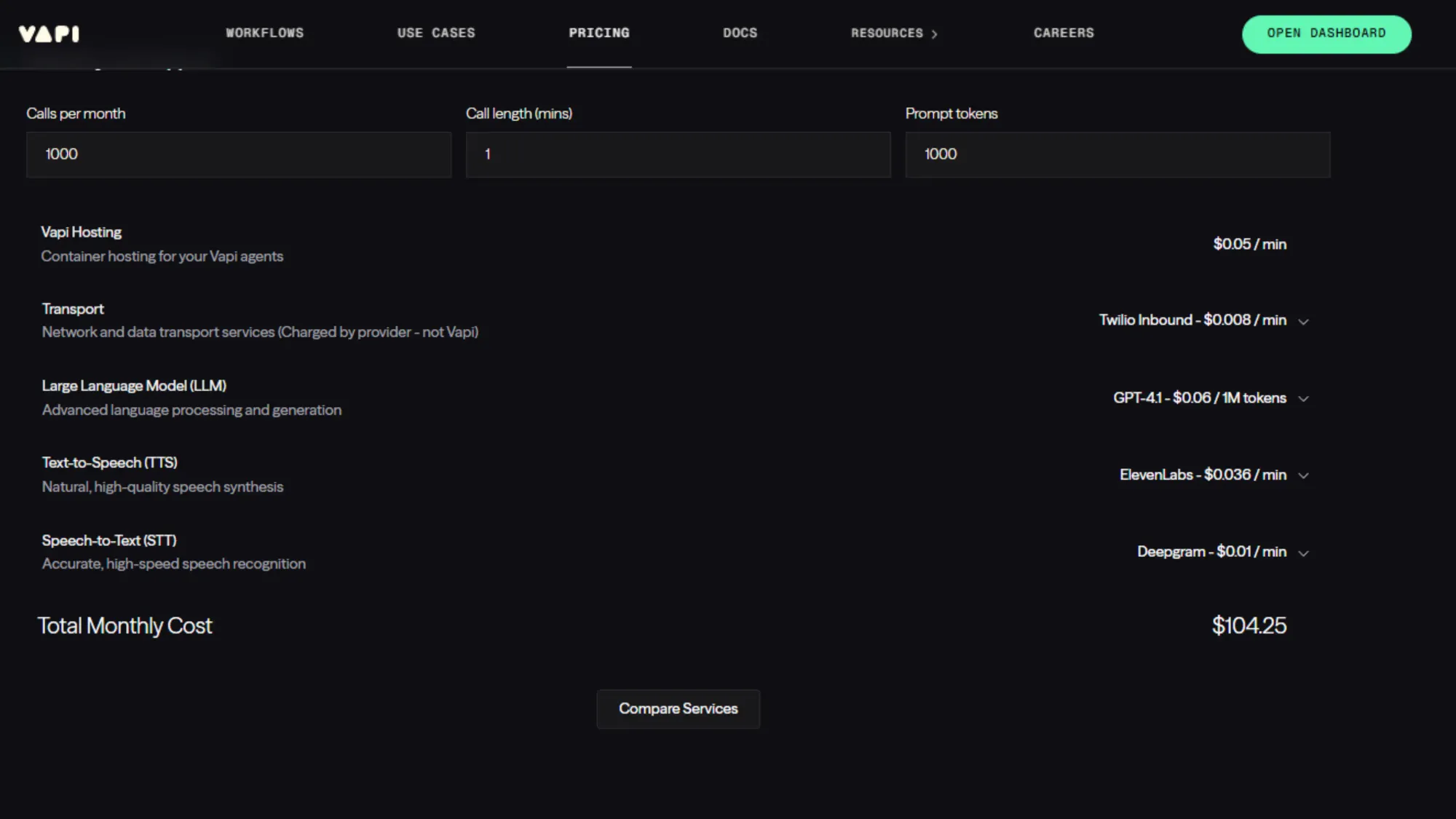
For 1,000 calls per month with an average duration of 1 minute and 1,000 prompt tokens per call, see the breakdown below.
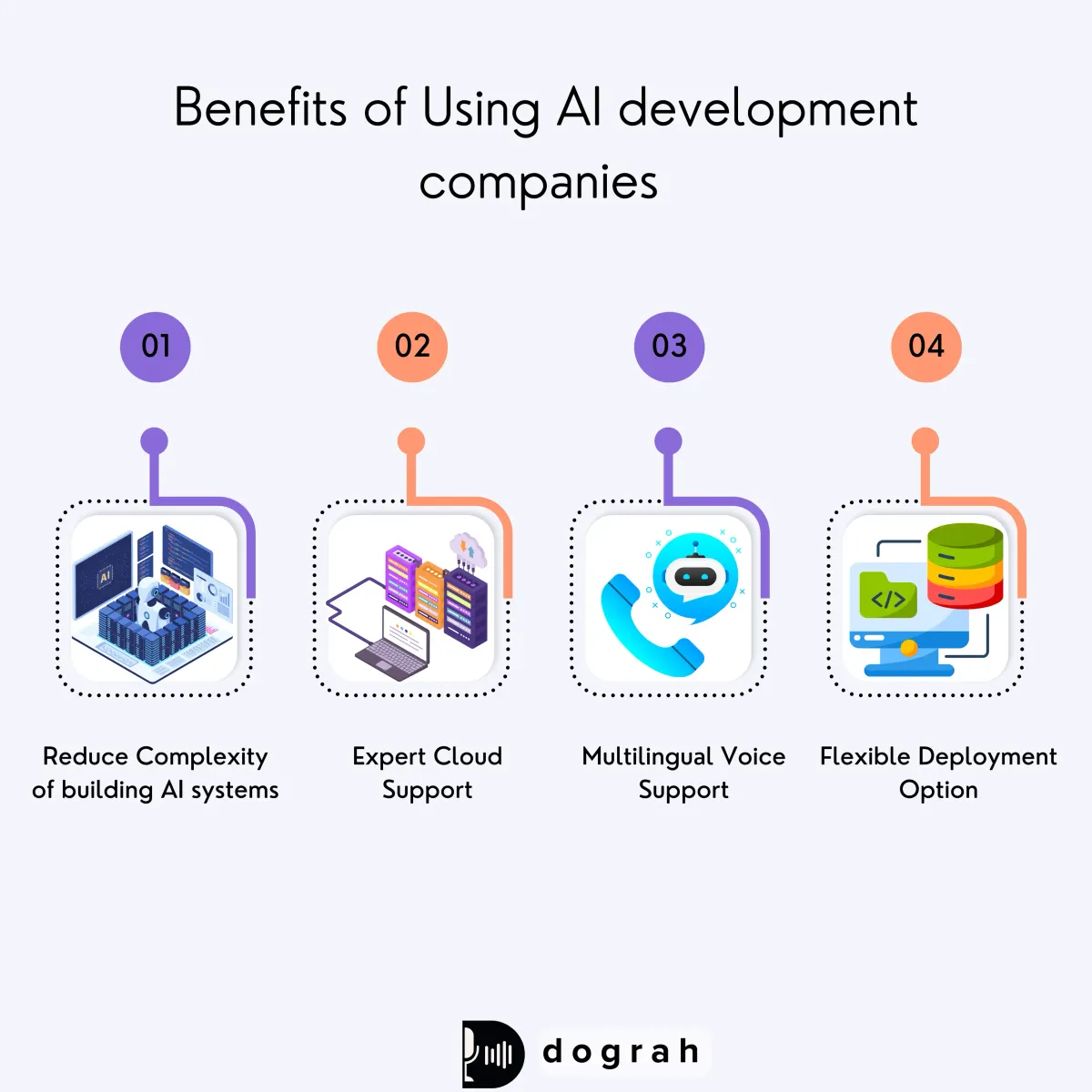
Top 10 Voice AI Calling Development Companies
Setup and Technical Needs
Vapi is made for flexibility and can be customized for large businesses, but setting it up takes some technical skill especially if you're using it at a big scale. Developers will find it powerful, but it may be tricky for people without a tech background.
Vapi manages orchestration, but you still have to set up and pay for other services like telephony, STT/TTS, and LLM separately. You’ll also need to manage different vendors and bills which can be complex if you’re not used to it.
How to Calculate your Monthly Bill with Vapi
A midsize business wants to set up an automated customer support line to handle 10,000 one-minute calls per month. The system will use around 1,000 prompt tokens per call and manage common tasks like booking appointments.
With Vapi :
- Plan - Startup $999.98/Month (Includes 7,500 Minutes)
- Hosting - 10,000 Calls per month x $0.05 = $500
- Transport - Twilio Inbound 10,000 Calls per month x $0.008 = $80
- LLM - GPT - 4.1 10,000 Calls per month x $0.06 = $600
- TTS - ElevenLabs 10,000 Calls per month x $0.036 = $360
- STT - Deepgram 10,000 Calls per month x $0.01 = $100
Estimated Total - $2639.98
The user needs to manage 5 different services (Hosting, Transport, LLM, STT, TTS).

The Ultimate Guide to AI Calling Implementation - By Dograh AI
Pros and Cons of Vapi Pricing
Pros
- Transparent Usage - Based Pricing - Vapi lists its pricing clearly, with a base rate of $0.05 per minute for each active call.
- Flexibility & Scalability - The pay-as-you-go model, bundled minute plans, and optional third-party integrations offer businesses flexibility and control over their setup.
- No Forced All in Bundles - You only pay for what you use there’s no required high base fee or unnecessary feature bundles.
- Enterprise Option - Large organizations can opt for fully custom plans that allow negotiation on high-volume discounts, enhanced support and compliance needs.
- Feature Rich at All Tiers - All plans whether Startup, Enterprise or ad-hoc include access to the core dashboard, analytics, Flow Studio, API/SDK, and come with 10 concurrent SIP lines by default.
- Free Trials - New users get $10 and 60 min free credits to test the services before committing.
Cons
- Unexpectedly High All-in Costs - Vapi’s $0.05/min fee doesn’t include third-party costs, which can raise total rates to $0.07–$0.25/min. For 10,000 minutes, monthly bills often reach around $2,900.
- Operational Complexibility - Users must manage 4–5 separate vendors (telephony, TTS/STT, LLM), each with its own billing adding complexity and risk of billing errors.
- Additional Charge for Surges & Concurrency - Vapi charges $10/month for each SIP line beyond the included 10, which can noticeably raise costs for businesses with high call concurrency.
- Non Technical Barrier - Though Vapi offers a no-code interface, it still demands strong prompt engineering and developer expertise for integration.
How Vapi Compares to Dograh
Dograh offers an open source solution without any platform charges. This makes it more cost-effective, customisable and scalable compared to Vapi.
Migrate from VAPI: Save upto 90% time with Dograh Voice AI.
Dograh offer an open-source, no-code Voice AI builder that lets you control and deploy voice agents in minutes with reliable multi-agent conversational flows.
What Dograh offers that Vapi doesn’t

Migrate from VAPI: Save upto 90% time with Dograh Voice AI.
Dograh offer an open-source, no-code Voice AI builder that lets you control and deploy voice agents in minutes with reliable multi-agent conversational flows.
The Bottom Line: Is Vapi AI Worth it ?
Vapi AI is a powerful and flexible platform with sub-600ms latency, but it's best suited for teams with solid technical skills. It demands deep prompt engineering knowledge, developer effort to integrate multiple third-party services, and careful cost tracking. Workflow setup and management can be time-consuming, posing challenges for non-technical users.
Getting started with Dograh
Interested in leveraging Dograh for lead generation, cold calling or business automation ? Here’s a streamlined path to getting started, along with direct links to essential resources :
1. Dograh AI: Quick Start Demo
2. Run Docker Command
Download and Start Dograh first startup may take 2-3 mins to download all images
3. Quick Start Instructions
How to Build AI Voice Agent - Step by Step with Dograh
Step by step written guide to building and deploying your first voice AI Agent
- Open Dashboard: Launch http://localhost:3000 on your browser.
- Choose Call Type: Select Inbound or Outbound calling.
- Name Your Bot: Use a short two-word name (e.g., Lead Qualification).
- Describe Use Case: In 5–10 words (e.g., Screen insurance form submissions for purchase intent).
- Launch: Your bot is ready! Open the bot and click Web Call to talk to it.
4. Community & Support
Join Slack Community and discuss issue with Dograh experts :
5. Additional Resource
Cost Optimization Strategies
To manage costs, use lower-cost models like GPT-3.5 or Claude Instant for basic tasks such as routine interactions or data gathering, and reserve premium models like GPT-4 for complex use cases. As one Reddit user noted, "I'm not an expert on Vapi costs, but if you want low latency, use one of the 'turbo' versions. I use ChatGPT-3.5 Turbo and get 850ms latency." You can also reduce expenses by using free telephony options like Vapi Telephony/SIP, Vapi WebSockets, or Daily WebRTC.
Final Thoughts
Vapi offers a flexible, developer-friendly voice AI platform with transparent base pricing, but actual costs can climb quickly when third-party services like telephony, STT/TTS and LLMs are added. It’s a strong fit for technical teams needing customization and scalability, though non-technical users may struggle with setup, prompt engineering and cost tracking. With smart model choices and free telephony options, costs can be optimized but it takes hands-on effort. Meanwhile, alternative platforms like Dograh offer open-source solutions that are free to use, making them more accessible for teams with limited budgets or technical resources.
Related Blog
- Discover the Top AI Communities to Join in 2025 for innovation and collaboration.
- Learn what makes Voice-Enabled AI Workflow Builders Effective in 2025.
- Discover how Making AI Outbound Calls Work: A Technical Guide for Call Centers can streamline automation and boost call efficiency.
- Explore AI Outbound Calling in 2025: What Actually Works Now to learn proven strategies for effective, real-world voice automation.
- See how 24/7 Virtual Receptionist Helps Small Firms Win More Clients by boosting responsiveness and improving customer engagement.
- Learn how How Call Automation Cuts Outbound Calling Costs by 60%: Virtual Assistant Guide can transform your call center’s efficiency and savings.
- Check out "The Ultimate Guide to Reduce Speech Latency in AI Calling [Proven]" for expert tips on making your voice agents faster and more responsive.
FAQ’s
1. How much does Vapi charge per minute ?
Vapi’s base rate is $0.05 per minute, though total per‑minute costs often rise when you include third‑party service fees like telephony, STT/TTS, and LLM models.
2. Is Vapi AI expensive ?
Yes, while Vapi AI’s headline rate is $0.05 per minute, hidden charges from third‑party services (like telephony, STT, TTS, and LLMs) often make it much more expensive.
3. How to use Vapi for free ?
Vapi offers $10 and 60 min of free credits to new users before committing to the services. The platform also provides free telephony services like Vapi Telephony/SIP, Vapi WebSockets or Daily WebRTC.
4. How does Vapi work?
Vapi works by orchestrating calls connecting telephony, STT/TTS, and LLM models through its Flow Studio, Vapi CLI and API while managing routing and logic.
5. Is Vapi free ?
No, Vapi isn’t free you have to pay a base fee of $0.05/min plus extra for third-party services like telephony, STT, and LLM models.
6. What is the Vapi AI tool ?
Vapi AI is a voice‑AI automation platform for businesses, enabling you to build custom voice workflows using telephony, STT/TTS and LLM integrations.
Was this article helpful?





